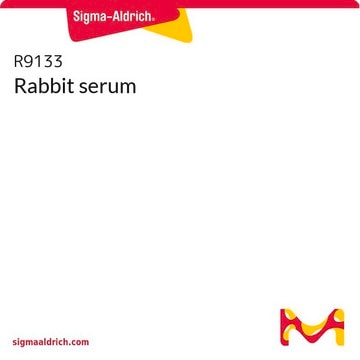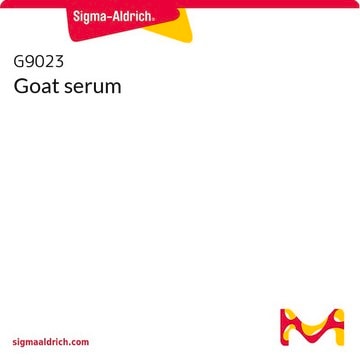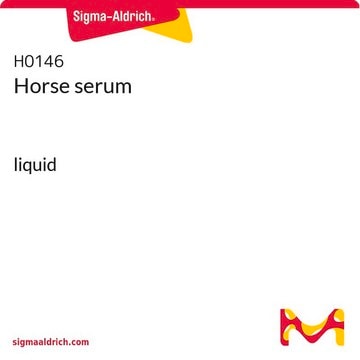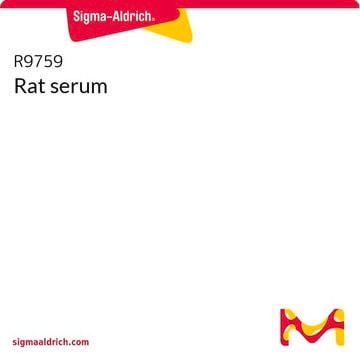S3772
Sérum
Synonyme(s) :
Sheep serum
Se connecterpour consulter vos tarifs contractuels et ceux de votre entreprise/organisme
About This Item
Code UNSPSC :
12352203
Nomenclature NACRES :
NA.46
Produits recommandés
Description générale
Sheep Serum is a pooled preparation obtained from a normal donor herd.
Application
Sheep serum can be used as a blocking agent and control in immunoassays. It has also been used to block non-specific reactivity in immunohistochemistry of frozen rat levator labii superioris muscle tissue sections.
Sheep serum has been used as a blocking agent and control in immunoassays.
Clause de non-responsabilité
Unless otherwise stated in our catalog or other company documentation accompanying the product(s), our products are intended for research use only and are not to be used for any other purpose, which includes but is not limited to, unauthorized commercial uses, in vitro diagnostic uses, ex vivo or in vivo therapeutic uses or any type of consumption or application to humans or animals.
Mention d'avertissement
Warning
Mentions de danger
Conseils de prudence
Classification des risques
Aquatic Chronic 2 - Eye Irrit. 2 - Skin Irrit. 2 - Skin Sens. 1
Code de la classe de stockage
12 - Non Combustible Liquids
Classe de danger pour l'eau (WGK)
WGK 3
Point d'éclair (°F)
Not applicable
Point d'éclair (°C)
Not applicable
Équipement de protection individuelle
Eyeshields, Gloves
Certificats d'analyse (COA)
Recherchez un Certificats d'analyse (COA) en saisissant le numéro de lot du produit. Les numéros de lot figurent sur l'étiquette du produit après les mots "Lot" ou "Batch".
Déjà en possession de ce produit ?
Retrouvez la documentation relative aux produits que vous avez récemment achetés dans la Bibliothèque de documents.
Les clients ont également consulté
Emilia Evgenieva et al.
Neurorehabilitation and neural repair, 22(6), 754-768 (2008-07-10)
Using the rat facial nerve axotomy model, the authors recently showed that manual stimulation of denervated whiskerpad muscles reduced the posttransectional polyinnervation at the neuromuscular junctions and promoted full recovery of vibrissal whisking. Prompted by implications for rehabilitation therapy, the
Stoyan P Pavlov et al.
Experimental neurology, 211(1), 292-300 (2008-04-03)
We have recently shown in rat that daily manual stimulation (MS) of vibrissal muscles promotes recovery of whisking and reduces polyinnervation of muscle fibers following repair of the facial nerve (facial-facial anastomosis, FFA). Here, we examined whether these positive effects
A S Popratiloff et al.
The Journal of comparative neurology, 433(3), 364-379 (2001-04-12)
Chewing, swallowing, breathing, and vocalization in mammals require precise coordination of tongue movements with concomitant activities of the mimetic muscles. The neuroanatomic basis for this oro-facial coordination is not yet fully understood. After the stereotaxic microinjection of retrograde and anterograde
Ann Ng et al.
Developmental biology, 335(1), 208-215 (2009-09-08)
Glypican-3 (Gpc3) is a heparan sulfate proteoglycan (HSPG) expressed widely during vertebrate development. Loss-of-function mutations cause Simpson-Golabi-Behmel syndrome (SGBS), a rare and complex congenital overgrowth syndrome with a number of associated developmental abnormalities including congenital heart disease. We found that
Chang-Wen Hsieh et al.
The Journal of nutrition, 139(12), 2257-2265 (2009-10-09)
Obesity and type 2 diabetes are growing problems worldwide in adults and children. In this study, we focused on understanding the patterning of insulin resistance as a result of altered perinatal nutrition. We analyzed mice in which the binding site
Notre équipe de scientifiques dispose d'une expérience dans tous les secteurs de la recherche, notamment en sciences de la vie, science des matériaux, synthèse chimique, chromatographie, analyse et dans de nombreux autres domaines..
Contacter notre Service technique










